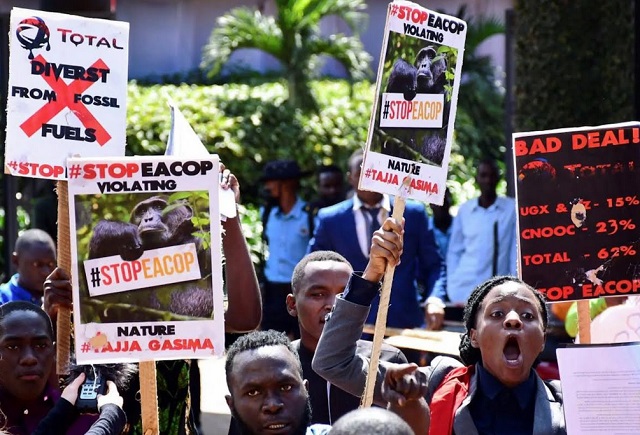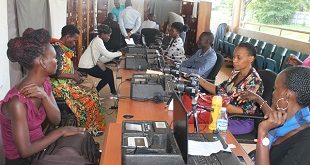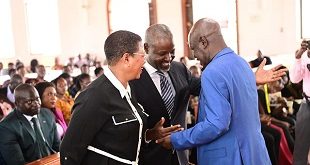
Security fears behind closer scrutiny of Uganda’s civil society
Kampala, Uganda | RONALD MUSOKE | On April 24, the 11th Parliament passed the NGO Amendment Bill, 2024 following several weeks of scrutiny. Among its new provisions is the return of the NGO Bureau back to the Ministry of Internal Affairs. Under the new law, the bureau will become a department in the Ministry of Internal Affairs and will be headed by a secretary under the supervision of the ministry’s permanent secretary.
Until now, the National Bureau for Non-Governmental Organisations has been a semi-autonomous body under the Ministry of Internal Affairs established under the NGO Act, 2016. It was given the mandate to register, regulate, coordinate, inspect, monitor and oversee all NGO operations in the country.
And its goal was to create a framework that strengthens the relationship between the NGO sector and the government as well as “enhance capacities and effectiveness in the areas of service delivery, advocacy and community empowerment.”
However, according to the MPs, the functions of the National Bureau of NGOs can now be performed in the Ministry, like it was the case before the bureau was created. The latest changes come at a time when the government is merging several agencies under a so-called rationalization policy in a move that government says is intended to cut public expenditure on ministries, departments and agencies that sometimes are said to duplicate roles and mandates.
“Its transfer intends to restructure and reorganize the bureau by eliminating a bloated structure and financial ambiguities in order to operate effectively as a department in the Ministry of Internal Affairs,” said MP Wilson Kajwengye Twinomugisha (NRM, Nyabushozi County), the Chairperson of the Committee on Defence and Internal Affairs on April 23. Apparently, the dissolution of the bureau will save the government from accumulating arrears of up to Shs 1.1 billion every year, being the costs of facilitating the NGO Board and Adjudication committee.
Fighting a security threat?
Several civil society actors have told The Independent they are unhappy with some of the explanations the MPs gave for the decision. They say the rationalization of the NGO Bureau has nothing to do with streamlining operations of the NGO sector in the country.
They point at how Speaker of Parliament, Anita Annet Among, cautioned the MPs during the plenary debate of the Bill. “I want you people to be very careful when talking about NGOs; this is where money is being laundered into the country; this is how homosexuality money is coming into the country,” she said.
Interestingly, during a quarterly dialogue held in November 2022 in Kampala between the Ministry of Internal Affairs, and NGOs, Maj. Gen. Kahinda Otafiire, the Minister of Internal Affairs told the meeting that although the government was in the process of rationalising a number of government agencies, including the NGO Bureau, the functionality and roles of the NGO Bureau would remain the same.
“I would like to call upon NGOs to know that we are partners in the development of this country and the health of this sector is of importance to us. There is need to promote and maintain high standards of governance, transparency and accountability in their operations,” Otafiire said.
But he also hinted on government’s long held fear of the NGO sector, noting that “there is need for more financial transparency and community participation by NGOs” “Ensuring compliance with the NGO Act, 2016, and the relevant laws is very important,” Otafiire said.
For many in government, NGOs are perceived as a threat to government. According to a guidance note prepared by the Financial Intelligence Authority (FIA) in June, 2020, NGOs “are vulnerable to crimes.”
The FIA noted how a non-profit organization may be set up as a sham business to bring illegally obtained funds into the financial system. Legitimately obtained funds can also be channeled through non-profit organizations and misused by terrorists to finance terrorist activities, it noted.
It said, for example, non-profit organizations may organize fundraising activities where the contributors to the fundraising activities believe that the funds will go to relief efforts abroad, but, some or all the funds end up being transferred to a terrorist group.
The FIA note was based on recommendation 8 of the Financial Action Task Force (FATF), an intergovernmental organisation formed to tackle the global challenge of money laundering, terrorist financing, and protect the international financial systems.
The FATF operates under 40 recommendations. Recommendation 8 requires countries to review the adequacy of their laws and regulations that relate to non-profit organisations identified as being at risk to terrorist financing abuse.
With the aim of complying with recommendation, Uganda enacted the Non-Government Organization Act, 2016, which provided for the registration of NGOs, the establishment and maintenance of a register of NGOs, the obligations of NGOs and for other related matters. Parliament also came up with several regulations that relate to non-profit organisations identified as being at risk of terrorist financing abuse.
For instance, all NGOs operating in Uganda are required by the Anti-Money Laundering Act (AMLA) and the Anti-Money Laundering (AML) regulations to register with the Financial Intelligence Authority, obtain due diligence information, report suspicious transactions and ensure that there are internal controls to prevent money laundering and financing of terrorism.
In addition, NGOs must appoint a money laundering officer, conduct risk assessment and give a report to the Financial Intelligence Authority (FIA) of the risk assessment, report terrorist funds/property, report large cash transactions, enhance record keeping, develop, implement and test their compliance programmes.
Still, the government remains jittery when it comes the operations of Non-Governmental Organizations in Uganda. Throughout the 2021 presidential campaign, President Yoweri Museveni told his supporters that unidentified foreign governments and agents are funding opposition groups in the country to destabilize Uganda.
While campaigning in Soroti, eastern Uganda, Museveni told his supporters that Robert Kyagulanyi Ssentamu, the then National Unity Platform (NUP)’s presidential candidate had foreign backers and funders who want to destabilize Uganda. Museveni also mentioned foreign homosexual groups that he claimed were funding youths in the country.
But many within Uganda’s civil society say this is part of an orchestrated plan by the government to clampdown on ever shrinking civic space in the country. In 2019, more than 12,000 civil society organizations were told they would no longer operate in Uganda.
Observers noted at the time how the move was the beginning of a purge of NGO activities in the country. This followed the government’s review of the number of officially registered NGOs in Uganda. Only 2,118 were given the green light to operate in the country.
In August, 2019, the Financial Intelligence Authority directed banks to release financial transaction details of 13 NGOs; including the now defunct Democratic Governance Facility and the Ugandan chapter of ActionAid International. A year later, in August, 2020, the government suspended operations of over 200 humanitarian agencies including 85 international groups accusing them of non-compliance with operational procedures.
Then on December 11, 2020, the government unexpectedly froze the bank accounts and clamped down on the activities of two NGOs–the Uganda NGO Forum and the Uganda Women’s Network (UWONET). A day earlier, on Dec. 10, Sydney Asubo, the then-ED of FIA, had written to the Director of Public Prosecutions saying FIA had received intelligence from one of the security agencies indicating that the two NGOs were involved in terrorism financing activities.
FIA ordered the freezing of seven bank accounts of the Uganda NGO Forum and 10 accounts of UWONET, is a network of over 100 women-led organizations across Uganda while the Uganda NGO Forum is the largest forum of NGOs in the country. Nothing came out of the investigations and the NGO resumed operations.
Civil society reacts
The passing of the of NGO Act (Amendment) Bill came in the same week the U.S Department of State’s Bureau of Democracy, Human Rights and Labour published its Country Reports on Human Rights Practices, including Uganda.

The report noted that while Uganda’s constitution and law provides for freedom of association, the government continues to disrespect this right. It noted how the government continues to restrict the operations of local nongovernmental organizations (NGOs), especially those working on civil and political rights, including human rights of LGBTQI+ persons. It said LGBTQI+ activists reported that the government of Uganda does not fully investigate attacks on LGBTQI+ advocacy organisations.
In June, 2019, the National Coalition of Human Rights Defenders, an umbrella of 140 NGOs in Uganda said its members had suffered 34 break-ins since 2011 but received no reports from police investigations.
The U.S. State Department report pointed at how the Uganda government revoked the operational mandate for international organisations working on human rights matters including the Office of the High Commissioner for Human Rights; issued regulations requiring NGOs to disclose sources of funding and personal information regarding employees, and imposed onerous registration and reporting requirements.
These regulations, the report noted, enabled the National Bureau for Nongovernmental Organizations (NGO Bureau), and its local-level structures to deny registration to any organisation focused on topics deemed “undesirable” or “prejudicial” to the “dignity of the people of Uganda.”
The regulations also provided the NGO Bureau with broad powers to inspect NGO offices and records and to suspend NGO activities without due process. The NGO Bureau imposed registration, permit renewal, and administrative fees, which local NGOs declared exorbitant.
The U.S report further noted that NGOs working on civil and political rights have continued to report the NGO Bureau and police officials carrying out numerous impromptu inspections of their offices, intimidating staff and threatening to close the premises, sometimes without cause. LGBTQI+ organisations reported frequent harassment by security officials and NGO Bureau officials.
Many in civil society say the NGO bureau getting back to the Internal Affairs ministry can only worsen the operations of NGOs in Uganda. Peter Wandera who heads the Uganda Chapter of Transparency International told The Independent on April 26 that it has always been a concern within the NGO sector in the country that the NGO Bureau being under the Ministry of Internal Affairs affects the operations of civil society.
He says sending back the bureau in the Internal Affairs ministry whose primary mandate is security gives the impression that NGOs are a security threat to the government.
“The government is simply trying to control and stifle the voice of the NGOs (yet) the NGOs are only interested in promoting good governance and ensuring that all Ugandans are offered good public services,” Wandera told The Independent.
Wandera says the appropriate ministry to host the NGO Bureau would be the Ministry of Gender, Labour and Social Development since its mandate aligns more with NGO work.
Dr. Livingstone Sewanyana, the Executive Director of the Foundation for Human Rights Initiative told The Independent on April 25 that although the government has advanced the view that rationalization of government agencies, particularly the NGO Bureau is intended to save public expenditure, the decision to take back the bureau to the Ministry of Internal Affairs is “a reversal of the progress that has been achieved over the last few years.”
Sewanyana told The Independent that compared to how it was in the Ministry of Internal Affairs before 2016, the NGO Bureau had developed a lot of capacity in serving the NGO sector. He hopes the decision taken has not been done with the view of weakening the sector because, “Whatever the perception around NGOs, they continue to play a very important role in Uganda’s economic and democratic development.”
He says the bureau had become resourceful and it was relatively easier for NGOs to get permits. “It had grown into a vibrant entity; so, the government should ensure that that progress is not hindered.”
Sewanyana says when President Yoweri Museveni assents to the bill, the Internal Affairs ministry should ensure that the department is well resourced (both financially and human resource) to carry out its mandate of promoting democracy, good governance and service delivery to Ugandans.
Bashir Twesigye, is the Executive Director of the Civic Response on Environment and Development. He also doubles as the Chairperson of the Civil Society Coalition on Oil and Gas (CSCO), a consortium of 60 grassroots, national and international civil society organisations that work to rally Ugandan citizens to ensure good governance of the country’s extractives industry including the oil and gas sector.
He told The Independent that the NGO Bureau’s return to the Internal Affairs ministry will not change anything. He says even when the bureau was semi-autonomous, the government continued tightening the civic space.
He too agrees with Peter Wandera saying taking the bureau to the Gender ministry would perhaps make more sense. The role of the Ministry of Internal Affairs has more to do with policing the NGO sector rather than playing a more supportive role to ensure that the sector grows and performs its mandate without any hindrance.
Meanwhile, Sewanyana says, rather than generalize the entire NGO sector, the government has many reporting and accountability mechanisms and agencies that should be able to detect and weed out the wrong elements in the NGO sector. He points to the Financial Intelligence Agency (FIA) and the Uganda Registration Services Bureau as key government agencies which should be able to help.
On the contrary, Wandera says, NGOs have been at the forefront of fighting the targeted vices. He says many NGOs have programmes that aimed at pushing back the challenge of money laundering in the country. “It’s just that we are too outspoken on issues of governance, transparency and accountability and this sometimes unsettles some people in government,” Wandera says.
 The Independent Uganda: You get the Truth we Pay the Price
The Independent Uganda: You get the Truth we Pay the Price


